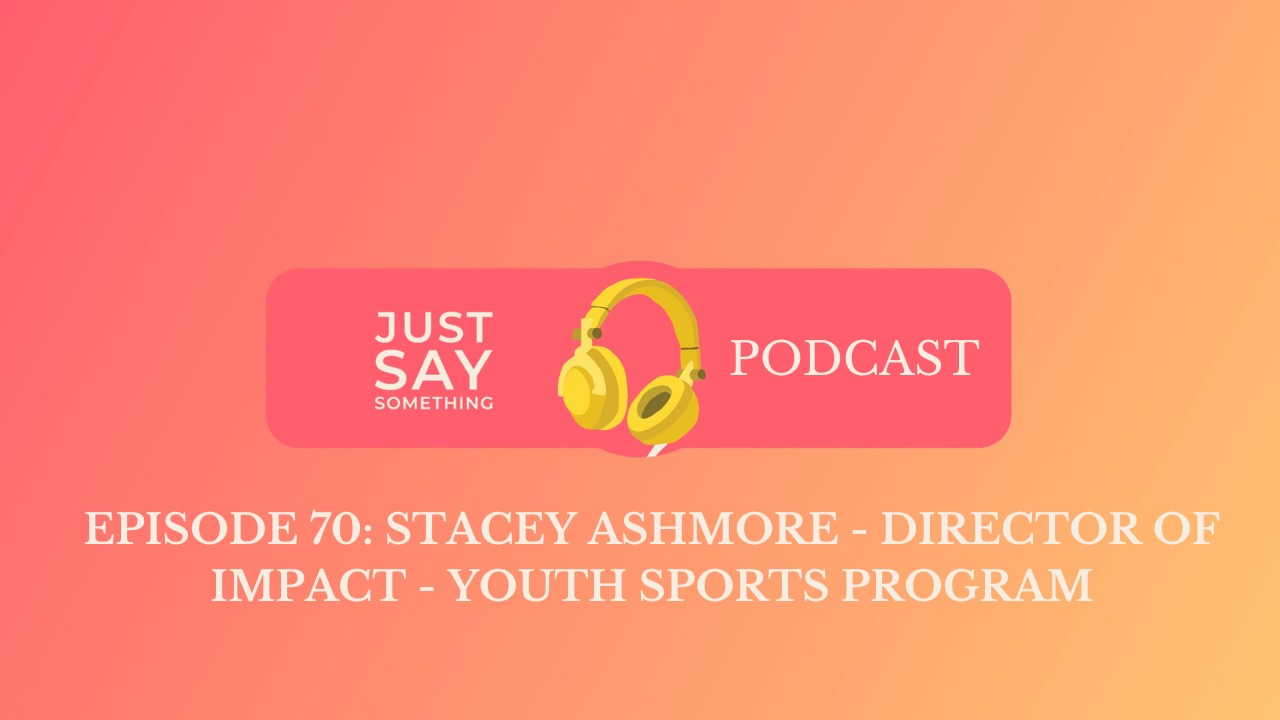Episode Transcript
[00:00:00] Speaker A: Foreign.
Good afternoon, this is Philip Clark at Just say Something and welcome to our weekly Just say Something podcast.
You can find it anywhere you find your favorite podcast and hopefully we're one of your favorites. But please like share, comment and subscribe and all that good stuff.
So, again, welcome back. And I know every week that we're on here that I have a guest almost. I always say I'm really, really happy to have this guest today. Well, I'll continue that. I'm really, really happy to have this guest today. And some of you may know him. If you don't, you will know him after the this after today's podcast.
So I am welcoming Mr. Derek Quarles.
And so, Derek, welcome.
[00:01:03] Speaker B: Thank you so much. Glad to be here.
[00:01:05] Speaker A: Oh, so instead of me stumbling over what I know about you, I would love for you to tell our audience because you're, you're a community activist, community organizer kind of guy. And what some people don't realize is you're also part of our team here. Just say something. And you bring a whole different perspective to, to what we're doing.
So how did you get into advocacy work? And give us a little bit about your background, please, sir.
Thanks again.
[00:01:42] Speaker B: Glad to be here.
So I got into advocacy work back in 2011.
I was home watching the news one night and I saw on the news where a lady who lived in a low income apartment community, her house had been shut up and she was that told her story that she was basically raising her grandchildren and that nobody was hurt, thankfully. But I mean, the bullets were just inches away from striking her and her grandkids and she'd lived in that community for 30 plus years and she was devastated. She was on the news crying.
And when I went to bed that night, I just kept thinking about it and thinking about it and woke up the next day thinking about it and didn't know anybody, like in the community, didn't know anything. And so I reached out to the apartment community and I reached out to the police chief at the time and the sheriff at the time, and neither of them came. They sent people from the sheriff's office and the police department and that was my like, first like organizing opportunity. And, and from there I've just been.
[00:02:46] Speaker A: Full throttle, non stop, non stop. That's great. That's great. And you know, there's, that was 2011.
Fast forward to 2025.
We're still having those same type of incidents all the time here in town.
So you've recently joined our team here and you are working on our Tobacco advocacy.
And so as you look at that, you know, talking to business owners for what we know from a health perspective, business owners look at it completely different.
So what are some of the concerns that you hear from some of the business owners who worry about smoking bands and how that might hurt their business?
[00:03:39] Speaker B: It's mainly from businesses that are like cigar shops or vape shops.
That's basically how they pay their bills, that's how they survive. And so. And they are opposed to any ordinance that would basically strip away their business.
There is an exception, though, in Fountain End. I met a gentleman who owns a vape shop and he gets it. He understands that, you know, that a lot of these policies are meant to keep, you know, tobacco and vaping out of everyone's hands, but particularly young people and underage people.
And so he has given his word. He'll be a champion for us in terms of the kids part of it, making sure that kids are not. Don't have access to these kind of things, which is really huge because we know that kids are vaping nowadays in schools. Kids are smoking in schools.
And so to have somebody who owns that type of business, and I think once we start having these conversations, more and more businesses and we get them to agree to the kids and then we get them to agree to something else, and then we finally, eventually get them to see things from the way we see it. And so it's a conversation piece, it's an education piece. And it's just being patient.
[00:04:51] Speaker A: I know when we first started this work back in the day in Greenville, adopted the smoke free ordinance, there were at first a lot of restaurants that were, oh, no, if people can't smoke in my restaurant, then they're not going to come and businesses go, is going to go down. I know one of our champions in this Also is Table 301, because Carl Sobisinski there was like, business increased.
We got busier after Greenville did the smoke free ordinance. So it's something more and more that the public, I think, comes to expect from those that are. That we put in positions to make some choices for us.
[00:05:36] Speaker B: Absolutely. I mean, it's almost common sense that people don't want to be around smoking. They're eating.
[00:05:42] Speaker A: Right. Right.
So when we talk about ordinances, what are, what are a couple of the big misperceptions that people have when we start talking about implementing an ordinance?
[00:06:01] Speaker B: I think it's the education piece again. And even with the elected officials who, people who you would expect to, like, understand, like, you know, how an ordinance may or may not impact their constituents, but the education piece is going to be. Is really huge.
Inviting the public out, letting them know, like, what the ordinance, you know, is saying and giving them an opportunity to offer input.
Every community is different. You know, every municipality is going to be different. And so, you know, the city of Greenville, while they have been proactive and have done this for a long time in Simpsonville, you know, the neighbors next door don't see it the way they see it. And so I think, you know, having maybe somebody from Greenville city to meet with somebody from Malden to talk about the impact in this. I mean, because me saying it to them and are you saying it to them is one thing, but then someone who actually is a colleague of theirs in a neighboring city and them sharing the impact of what this ordinance has had on the city in terms of economic development.
Because, let's face it, like, I mean, they care about money more than anything at this point.
[00:07:08] Speaker A: And so businesses are in business to make money, unlike those of us in the nonprofit world.
[00:07:15] Speaker B: Correct.
[00:07:16] Speaker A: Where we don't make money, we beg. Well, I don't want to say still, but I was going to say beg borrowed still.
But sometimes we do have to rob Peter to pay Paul. So, you know, it's a different mindset from the corporate world to the nonprofit world.
And so when you're looking at communities, I know we've.
Some elected officials have been super, super supportive of this, but then other ones are like, I don't want to tell the people that put me here what to do.
So what, what is, what's a good way to get them to see this in a different light?
[00:08:03] Speaker B: I think one of the ways that you've been doing it is, is again, going, going back to the education piece and sharing the data and the statistics, because that speaks volumes when people know.
I mean, because we, we all see the commercials, you know, about cancer and all those things, and it, and while it may have some sort of impact on us, you know, hearing people's personal stories who, you know, locally telling, you know, how, you know, for me personally, my grandmother died from, from, from cancer as a result of smoking.
And so for me, like, I don't want to be around smoke. I don't want my kids around smoke. I don't want anybody, my family around smoke. And so, but saying it in a way that people will receive it, not in a way that's forceful.
And again, even with elected officials and for the ones who are opposed to it, it's probably more than likely because they don't want to a ruffle and effectives of people who, you know, who may or may not put them back in office. And so it's not that they so much agree with, you know, whether they should be smoking or not in public. It's a matter of me being reelected. And we got to get past that. I mean, because people's health is way more important than a person being reelected.
[00:09:16] Speaker A: Right, right. And so what we do know, and I'm the statistic geek.
[00:09:21] Speaker B: Yes.
[00:09:22] Speaker A: Is that tobacco in the state of South Carolina cost us an additional $2.2 billion in additional health care costs on an annual basis just right here in South Carolina. And then we also know that when it comes to lost productivity based on tobacco use, it's more like five point, I think, six or seven billion dollars.
And to me, those numbers are just astronomical because somewhere in our systems, we're having to pay that extra fee. So I think it comes out to, like, I want to say eleven hundred dollars per household in additional fees or taxes annually, because so many people smoke.
[00:10:15] Speaker B: Yeah. Or exposed to smoke.
[00:10:17] Speaker A: Or exposed to smoke. Right, right. And also what we know is 80% of the smokers out there start before they're 18 years old, so adults don't start smoking.
And so again, it's that education and that awareness of the dangers that kids are doing to themselves.
Once they get that first hit of that nicotine in the brain, they get that buzz and they never have that feeling again.
It's unfortunate.
So with the tobacco work and with the other pieces that we're working on here, it just say something.
What are. Is there something else that you would like for our listening audience to know one about your work or to know about Derek Quarles?
[00:11:13] Speaker B: Yes. So I actually got my started just as something when I was a high school student and interned here. And although it was a different name then, but, you know, programs like this, and specifically this one helped myself and folks I know to not use nicotine, to not, you know, do the alcohol underage, and those kind of things. And so these kind of programs are important. We have a youth summit coming up this summer that, you know, every kid that in middle school should be signing up for, because not only are we saying, don't do drugs and don't drink underage, we're also saying, like, just be you and be positive and make it make a difference in your own community, but also in your own life.
I know that there are a lot of challenges that kids are having nowadays, especially with social media and all the peer pressure that comes with that and all the pressures that just come from pubic.
But in every single young person. I mean, no matter how young you are, there's a leader inside of you. And I think if we can tap into that at this conference, then we'll see a lot of. A lot more changes happening here locally in terms of, like, the crime and all those things that happen with young people.
[00:12:28] Speaker A: Right. And, you know, I know I've had this conversation with others, and it's not an individual entity within our community.
It's our entire community. It's an issue for the community.
It's not that the. Well, the health department or the police or the schools. We've got to do this collectively to really make a difference in our community and in the lives of the kids that are in our community.
[00:12:57] Speaker B: Absolutely. And I really like this conference that we're. That the kids are, like, taking, and I hate the kids, but the young people, they're taking like they're leading this.
We're giving them a platform, but they're leading this. The interns are high school and college students who are leading this. And so it's really going to be a great opportunity for those high school kids and college students to hone in on their leadership skills, but also for the middle school kids to tap into who they are.
[00:13:24] Speaker A: Right, right. So for the parents who are listening, if you have a child that's in middle school, you can go to takeitbackyouthsummit.com to find out more information about this. We do have a limited number of spots, so we'd hate for your middle schooler to be left out. But if you also want to know more about our tobacco policy and ordinance work, you can go to airpreserve.org and there you can see our partners. You can find model policies. There's a whole host of information. There's especially about what secondhand smoke and vaping can do to the citizens in our community.
All right, well, this brings us to the end of another weekly podcast. Derek, I want to thank you for being here with us. It's been great. Hopefully, we can have you back soon. And again, this is Philip Clark with Just say Something podcast, and be sure to, like, share, comment, and subscribe. Thank you, sir. I appreciate that. And we will see you all next week. Thank you.


